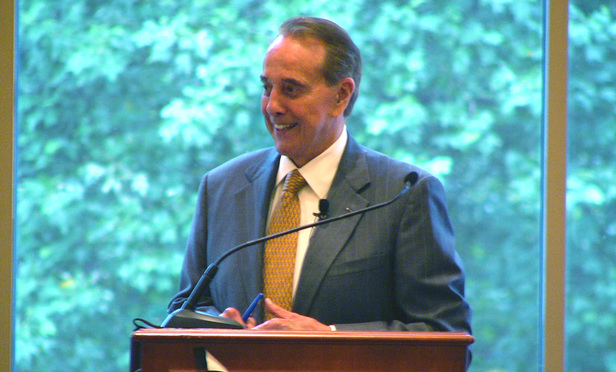Former senator and Alston & Bird special counsel Bob Dole told The Wall Street Journal Monday that he and his firm helped arrange the president-elect’s taboo-breaking Friday telephone call with Taiwanese President Tsai Ing-wen. “It’s fair to say that we may have had some influence,” Dole told the paper.
Dole and Ted Schroeder, a former Senate Democratic aide who joined Alston & Bird in January as counsel in its Legislative and Public Policy Group, are on a $20,000-a-month retainer to the Taipei Economic and Cultural Representative Office, according to a lobbyist filing dated April 30. The office is Taiwan’s alternative to an embassy or consulate, handling foreign affairs and services for the Republic of China, commonly known as Taiwan.
In the lobbyist filing, Alston & Bird reported making routine diplomatic contacts on behalf of Taiwan’s U.S. representative. Awkwardly, the firm opened a three-lawyer Beijing office in January, specializing in IP, trade, tort and cyber disputes for Chinese clients in American forums. Alston & Bird did not respond to a request for comment. Daniel Huang, a spokesman for the Taipei Economic and Cultural Representative Office, said the office had no comment.
Breaking a diplomatic taboo that dates to 1979, the U.S. call with Taiwan’s head of state roiled the chattering classes in both nations, perhaps because China has more than 1,600 ballistic and cruise missiles facing the Taiwan Strait, and dozens aimed at the U.S. A far more measured but nontrivial way for China to retaliate would be for it to return once again to cyberespionage, whose decline was an unsung Obama success. Nick Rossmann of FireEye iSIGHT Intelligence says that while he detects no new change in hacking patterns, “an economic downturn in China coupled with a deterioration in the U.S.-Chinese bilateral relationship would be key factors in a shift to ramp up operations to steal IP.”
The Taiwan call made a parlor game of guessing Trump’s motives for lightly playing with the world’s highest concentration of missiles, and tweaking a rising superpower that fights to keep its own military’s jingoists in check.
“Defensiveness, ignorance, impulsivity, considered aggressive behavior, on-going real estate negotiations?” muses Josh Marshall of Talking Points Memo. “Not having a clear idea about which of these factors is driving decisions is and will be one of the joys of the Trump years.”
Initial speculation centered on ignorance or impulsivity. “This has all the earmarks of randomness on the U.S. side,” a senior Bush diplomat told Politico. Others noted a Taiwanese newspaper report, denied by the Trump Organization, that Trump was considering a luxury development near Taipei’s airport. The New York Times reported that a sales manager overseeing Asia for Trump Hotels had visited Taiwan in October, a trip that she recorded on her Facebook page.
As the consensus shifted toward “considered aggressive behavior” (or at least considered by Trump’s aides), the first reports pointed the finger at former Dick Cheney aide and Heritage Foundation scholar Stephen Yates. But Yates denied the reports, while voicing warm support for the reckless break in protocol.
Thanks to Dole’s candor, we now know who really deserves blame for Trump’s first foreign policy blunder. And to ignorance, impulsivity, aggression and conflicts, we must add another animating factor. Even in the drained swamp of Trump’s Washington, don’t discount the power of lobbying.
Contact Michael D. Goldhaber at [email protected].
Copyright The American Lawyer. All rights reserved. This material may not be published, broadcast, rewritten, or redistributed.





